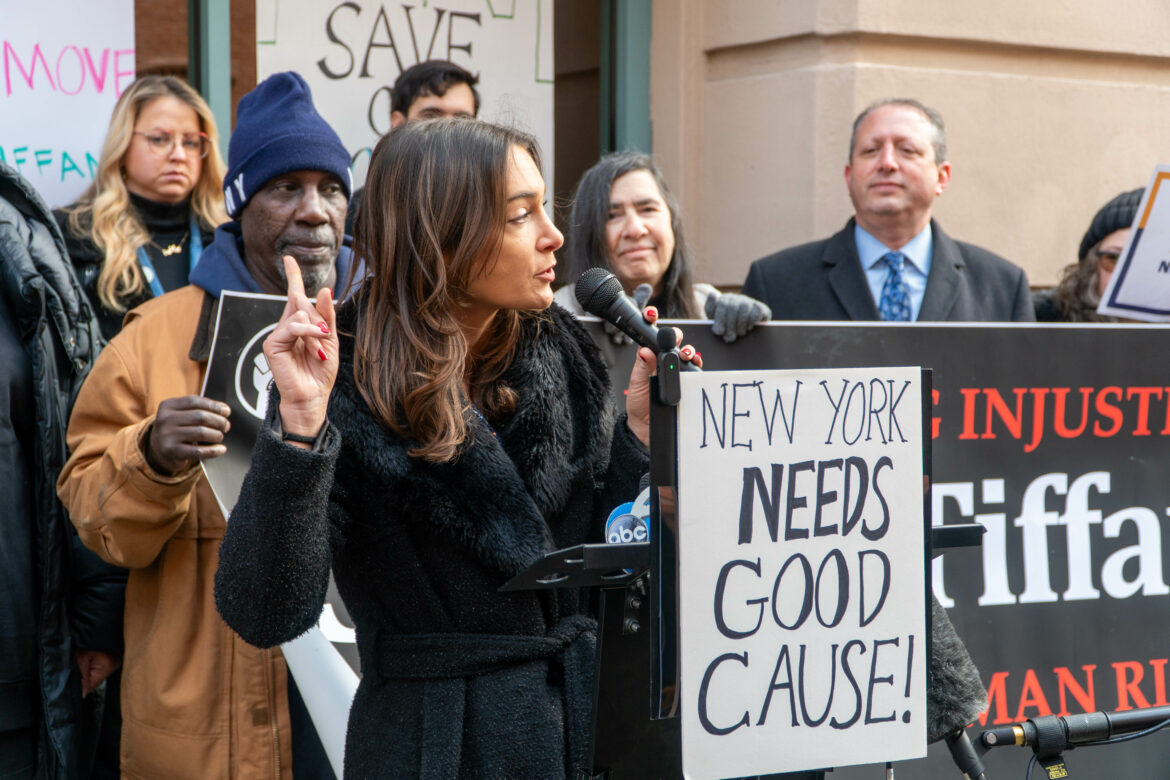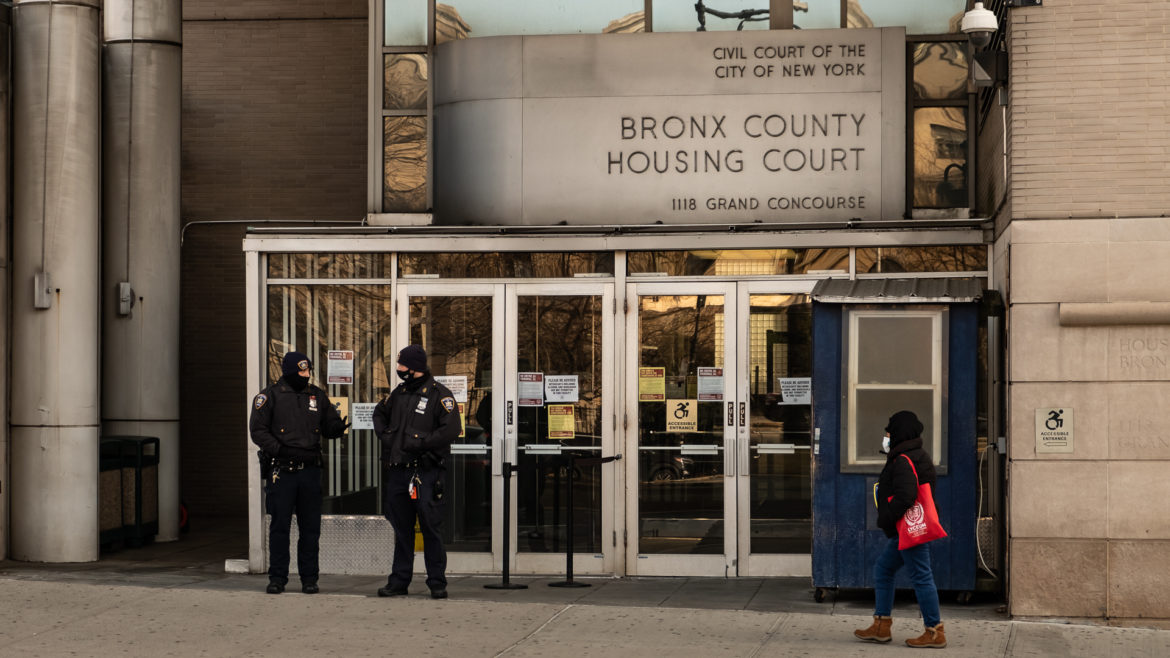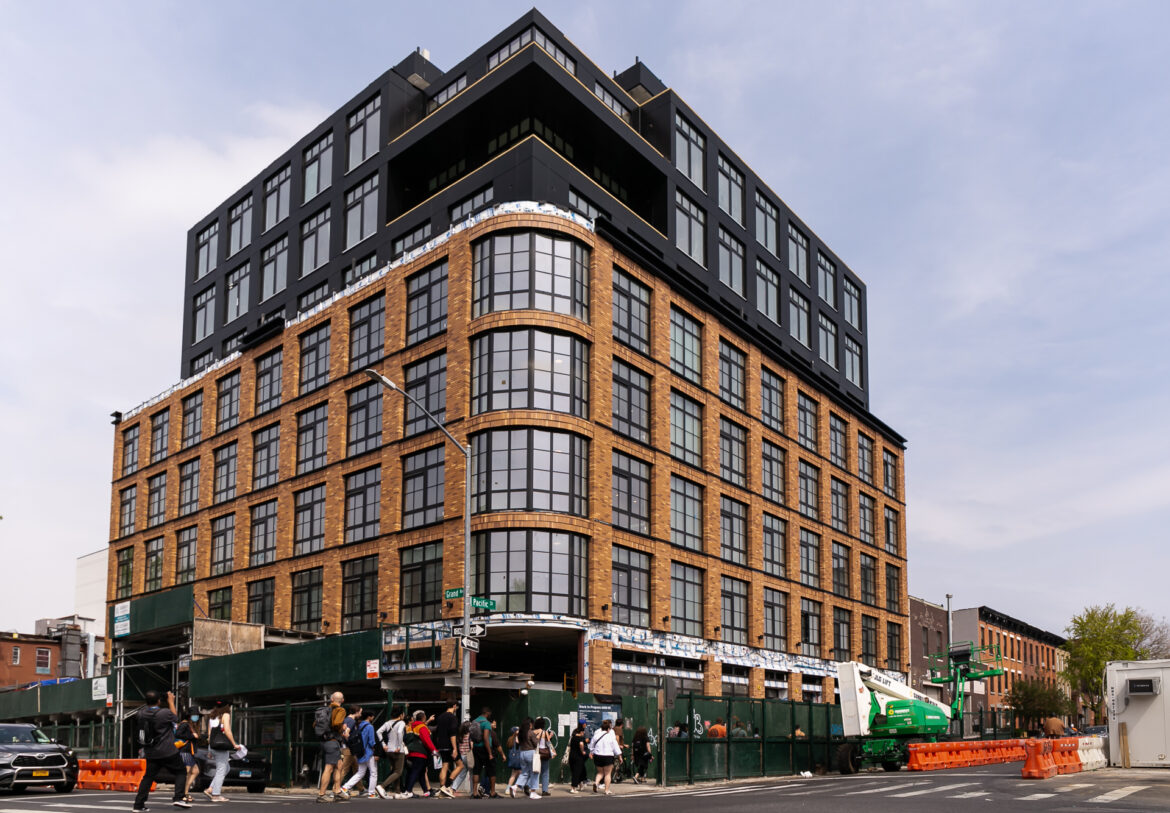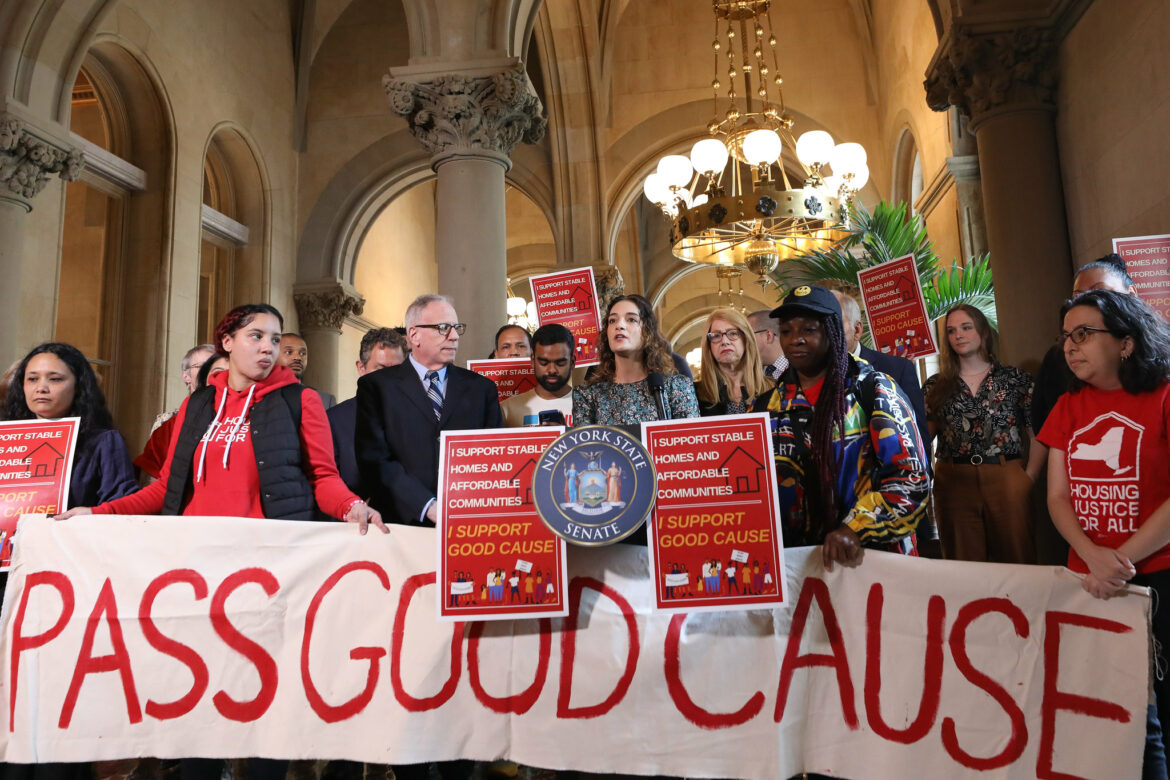“The enforcement mechanism has truly always been the courts,” said Good Cause sponsor State Sen. Julia Salazar, as anticipation mounts for litigation that will hash out the reach of the new tenant protection law.

Chris Janaro
State Sen. Julia Salazar at a rally calling for passage of good cause eviction legislation on Feb. 22, 2024.
New York’s Good Cause Eviction law was enacted more than four months ago. The recent introduction of a tenant notification requirement has heightened expectations of coming legal battles that may help define its reach—as tenants aim to utilize the law and landlords navigate compliance.
Inspired by similar protections in places like California and Washington D.C., including good cause protections was a crucial bargaining tool during state budget negotiations, sought by tenant advocates and progressive lawmakers to go alongside a replacement of 421-a, a housing developer tax incentive that expired in 2022.
But to the disappointment of many good cause supporters, the version of the law passed in the 2025 fiscal year budget saw the reach of its tenant protections scaled back, and left some of the wording vague.
Since Aug. 18, New York City landlords are required to notify tenants of whether the law applies to them when issuing new or renewed leases, rental increases, and notices of eviction or litigation.
Now, legal experts and advocates for both tenants and property owners have begun to weigh in on what’s to come, and what may get ironed out for the new law in an already beleaguered city housing court system.
“A lot of people are about to learn if they’re covered by good cause,” said Andrea Shapiro, director of programs and advocacy at the Met Council on Housing. This includes tenants with existing protections who aren’t impacted by the law, she added. “So you can be rent-stabilized, and you’ll get a note saying whether you’re covered by good cause, which obviously you aren’t —but just to make sure.”
Who’s covered, who’s not
In principle, good cause is a housing court defense that protects tenants from eviction without a legally sufficient reason, such as failing to pay rent, violating lease terms, or being a nuisance. It can also provide defense against rent increases over a certain threshold.
Try It Out: City Limits’ NYC ‘Good Cause’ Rent Calculator
But it can be complicated for tenants to determine whether or not their residence qualifies under good cause. Tenants living in rent-stabilized apartments or other rent-regulated frameworks, such as NYCHA, are not covered under good cause since they are already afforded many of the same protections.
In New York City, homes owned by smaller landlords—defined as those who own 10 or fewer units—are exempt from the law, as are buildings with 10 or fewer units if the owner resides there, even if that owner has additional properties elsewhere.
Homes provided as part of a job, condos, co-ops, seasonal homes, certain senior and healthcare facilities, manufactured homes, hotel rooms, dormitories, and religious facilities aren’t covered. Neither are properties built after Jan. 1, 2009, where good cause protections won’t kick in until 30 years after construction.
The law also excludes homes renting for more than 245 percent of Fair Market Rent (FMR) set by the Department of Housing and Urban Development (HUD). In 2024, this means rents exceeding $5,486 for a studio in New York City, $6,005 for a one-bedroom, $6,742 for a two-bedroom, $8,413 for a three-bedroom, and $9,065 for a four-bedroom.
“The law is a great step forward, but it’s not the most perfectly worded,” said Jeremiah Schlotman, director of litigation for housing at Legal Services NYC. “There are certain loopholes or areas that [our] tenant advocates are preparing ourselves to litigate because we think they will be exploited by landlords.”
These anticipated loopholes include landlords hiding the total number of units they own by using an LLC, or Limited Liability Company, to obscure whether they are subject to the law.
Another could involve landlords claiming demolition plans as an exception to good cause, but not following through with it.
“What if the landlord says, ‘I want to demolish, you need to move out,’ and then the landlord never does. But then the landlord says: ‘No, it was in good faith, I just changed my mind,” said Schlotman. “This can get dicey because how do you know what’s a good faith intention or not? So we’re saying that must mean something. You must be able to prove something significant or have substantial proof.”
Some well-informed tenants have successfully used good cause to resolve lease issues with their landlords, avoiding rent hikes and eviction, without having to take legal action. But if that fails, the only way for tenants to legally address their concerns is to take the matter to court.
”One of the drawbacks is that you are going to be in housing court, because you have to sit back and get sued for eviction before you can avail yourself with a good cause eviction protection,” Schlotman said.

Adi Talwar
Bronx County Housing Court in January 2022.
Headed to court
This is the scenario AnnLynn Hayashi, a 27-year resident who is raising two daughters at the Flora apartments at 310 East 12 St. in Manhattan, has found herself in. After the building changed hands in 2022, the new owner, listed on city property records as EVMF Owner LLC, stopped renewing leases for market-rate units in her building.
Hayashi and a neighbor both had leases ending at the end of May, and they were both overjoyed when they heard that good cause had passed into law, and could offer them recourse from eviction.
“Talk about luck. We’re like, oh my god, this is fantastic. We’ll be covered,” said Hayashi.
However, their exuberance was short-lived. “We write for our new leases, and our landlord writes back, ‘Oh, I’m sorry. We’re going to use a demolition clause. We’re going to demolish and renovate your apartment.”
Hayashi believes the demolition plan is a falsehood, and the owner is simply converting the market-rate units individually into dormitory-style apartments and increasing the rent.
“It’s not true. They’re just renovating. There’s no demolishing happening in our building, so they’re trying to get away with this little loophole,” she said.
Filings on the Department of Buildings’ website list a number of work applications filed since the start of the year, including for gut rehabilitation jobs dated earlier this month for six apartments.
A representative of the building’s owner, EVMF Owner LLC, declined to comment for this story.
After her lease ended in May, Hayashi continued making her rent payments to the landlord, which were accepted until last month’s payment was returned to her shortly before she received an eviction litigation notice on her door, with a court date.
Hayashi plans to fight it in housing court and recently acquired legal representation, which adjourned her court date until the end of October so she and her attorney can prepare a response to the litigation and request discovery.
Lawyers representing both landlords and tenants foresee a rise in tenants requesting discovery in these cases. Discovery, the process where both parties exchange information before trial, can be utilized to determine if a residence qualifies under the good cause law.
“It seems like there’s some attorneys chomping at the bit already,” said Ann Korchak, board president of Small Property Owners of New York (SPONY).
In housing court, discovery is not an automatic phase of the trial; it must be requested explicitly by one of the parties. Property owners and their lawyers worry that this could delay proceedings by months or longer.
“Landlords are not getting rent during this time, and tenants are falling behind in rent during this time,” says landlord attorney Lisa Faham-Selzer, a partner at Kucker Marino Winiarsky & Bittens LLP. “So it’s going to be really hard once the motion is decided for the tenant to reconcile the balance owed and for the landlord to sustain not getting paid rent.”
But tenant lawyers counter that discovery is the most effective method of determining whether the law applies to their good cause clients, and regardless of any additional court time—it’s a tenant’s right to request it.
“So with respect to this idea that it’s going to bog down cases and slow down the eviction proceedings—it’s called due process,” said Dannelly Rodriguez, a staff attorney with Legal Services NYC.
He currently represents a group of tenants in a building in Corona, Queens, which he believes qualifies for the good cause defense after their rent was raised substantially higher than this year’s allowable threshold of 8.82 percent.
“It’s a fundamental right for anyone in America facing legal proceedings,” Rodriguez added. “You have a right to move for discovery, to determine whether good cause applies or not, and if that’s what needs to be done, that’s what needs to be done.”

Adi Talwar
Apartments on Atlantic Avenue and Pacific Street in Brooklyn.
Notification requirements add some confusion
Another frustration is the perceived lack of guidance on complying with the new law, with some wishing the state’s Division of Housing and Community Renewal (DHCR) provided clearer direction and a tenant notification form for landlords to use.
“The expectation was that DHCR would promulgate a notice so that we were all using the same language,” said Korchak of SPONY. “DHCR is not a tenant-only body; they’re responsible for advising owners as well. So that’s disappointing.”
The law does not charge DHCR with publishing a tenant notice. It’s only responsible for publishing annual notices that outline the localities participating in good cause—outside the five boroughs, towns and cities were given the choice to “opt” into the program—as well as other details, like the applicable percentage of FMR that qualifies for exemptions, and definitions of small landlords.
While DHCR doesn’t directly provide landlords with the notification form, it is published in its entirety under section 231-c of the Real Property Law for landlords to use and for tenants to help identify the validity of their own cases.
Regardless of whether or not a residential unit falls under the law’s protections, all new leases, renewals, and eviction litigations are now required to include a good cause notification spelling out whether the law applies to the tenant and, if not, the reason why.
But both tenant and landlord lawyers worry that notifying non-applicable tenants, like those living in rent-stabilized units who aren’t covered by good cause, is unnecessary, since they already receive similar protections under New York’s rent regulation laws.
“Think about the waste there. Housing court has so many cases that need to go through the process,” says Korchak, who believes that the requirement will create pointless tie-ups in court from rent-stabilized tenants. “What a waste of time. It’s just where they could have just added that one sentence to the bill.”
Conversely, tenant advocates worry that the notification will confuse ineligible tenants who already benefit from stronger rent protections.
“So rent-stabilized tenants are getting riders that say, ‘Hey, you’re not covered by good cause,’ even though rent stabilization is much stronger than good cause and contains all the same provisions and more,” said Cea Weaver, coalition director at Housing Justice for All. “So it’s true that they’re not covered by this specific law, but it’s misleading and scary for renters, and that’s just sloppy.”
State Sen. Julia Salazar, who has sponsored a good cause bill since 2019, is pleased with the positive impact the law could have on tenants, even if her version underwent carve outs to get passed during budget negotiations.

NYS Senate Media Services
Lawmakers and housing activists at a rally to support the good cause bill last year.
“I think that, as of now, the law is really strong,” said Salazar. “The enforcement mechanism has truly always been the courts, and it’s always been extremely important that we educate tenants about their rights so that landlords can’t simply misrepresent the law or fail to comply.”
To tenant advocates, “good cause” represents a step in the right direction, even if it’s imperfect.
Ultimately, however, they still want to see stronger rent stabilization protections, as was seen with the 2019 Housing Stability and Tenant Protection Act (HSTPA)—a major win for tenants that significantly curtailed rent-raising between rent-stabilized tenancies. Beyond New York City, several cities and towns are in the process of adopting rent regulation, or exploring it.
“We need more rent stabilization,” says Shapiro, who believes that good cause has always been “like a crutch” on the way toward stronger tenant protections. “There are definitely some loopholes and things that we’re trying to get small fixes on. But in reality, we want stronger laws, and good cause is a stepping stone on that way.”
For good cause sponsor Sen. Salazar, the fight for tenants involves improving both measures.
“Frankly, for my part, I think we still have a lot of work to do to ensure that every renter, every person in New York state, has housing stability and housing security. And so, I join them in demanding an expansion of rent stabilization,” says Sen. Salazar, adding, “I’m also eager to see the Good Cause Eviction lobby as strong as it possibly can be.”
To reach the reporter behind this story, contact Chris@citylimits.org. To reach the editor, contact Jeanmarie@citylimits.org
Want to republish this story? Find City Limits’ reprint policy here.





